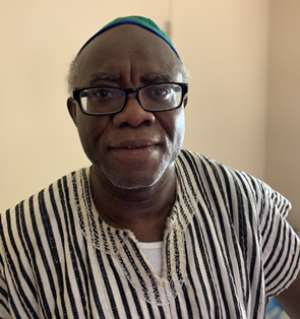
I watched the videoclip and read the script of Ms. Bridget Otoo’s interview with Nii Akwei Ismail Akwei on the latter’s “The Lowdown” program on Ghanaweb.com (11/10/21) and could not help but laugh myself literally off my chair. In the aforementioned interview, the locally renowned broadcast journalist states that the degree or diploma that she earned, one really hopes, from the Ghana Institute of Journalism (GIJ) was “rubbish” or worthless because she left the latter institutional establishment without knowing how to write a simple news story or “news script,” as she preferred to put it in the interview.
The implication here is that, somehow, either or both the curriculum and the instructors on the staff or faculty of the Ghana Institute of Journalism may not be qualified for the practice of their professional designation. In the case of the curriculum, the latter may very well have been irredeemably substandard, in the opinion of this bitter critic. Now, this is quite interesting because it is also very possible that Ms. Otoo provided some “delicious” favors – sexual favors included – to her instructors in order to “successfully” sail her way through and out of the GIJ and may never really have been either qualified or talented enough for the discipline which the Sekondi-Takoradi native – I am reliably informed – opted to train in for the job market.
I am also very certain that there are dozens of other GIJ graduates, including some of Ms. Otoo’s own classmates, who graduated from the same institution with the requisite news- and scriptwriting skills. You see, academies and institutional establishments like the Ghana Institute of Journalism are professional-training facilities and facilitators or enablers. They assist qualified and talented students to prepare themselves for the job market; they do not study for apparently obtuse and untalented entrants and graduates like our presumptuous critic. As my grammar schoolteachers used to admonish us two generations ago at the Akyem-Asiakwa Presbyterian Primary School, and the Akuapem-Akropong Presbyterian Middle Boys’ Boarding School (SALEM), it is tantamount to the height of criminal absurdity for any pupil or student to expect her/his teachers to split their heads open and slip in their textbooks and syllabi.
The diligent and ambitious student has to meet their instructors and teachers at least halfway in the study and learning process. Ms. Otoo does not appear to have taken her studies and professional preparation courses seriously, thus her bitter gripe against the instructors and curriculum of the Ghana Institute of Journalism. I have said this before innumerable times that for most of the time that it has been in existence, at least since 1958 or thereabouts, the GIJ has not been afforded the sort of funding that it requires to function as a first-rate institutional establishment of its kind. Plus, the fact that the autocratic political climate in the country did not conduce to the salutary evolution and development of the GIJ. Nevertheless, the GIJ has produced a quite remarkable number of professionally competent journalists and media and public relations operatives. Like any other academic and professional establishment around the globe, not everybody who attends and graduates from such Ivy League establishments as Princeton, Columbia and Harvard universities is “Ivy Material.”
There are quite a remarkable few who may have been admitted by default or rich familial connections. As well, like many a liberal arts and humanities discipline, especially highly specialized disciplines like the engineering sciences, not everybody in these fields of professional practices necessarily needed to have undergone the standard curricular training in order to succeed in or at the same. It is an age-old universal observation or phenomenon that there will always be exceptions to the proverbial rule. The fact that well-known and distinguished practitioners of the journalism or media trade like Messrs. Kweku Baako and Kwami Sefa Kayi and Ms. Serwaa Amihere, among dozens of others, did not enter the media field via the standard or normal method does not absolutely in any way render formal professional training such as that which is offered by the Ghana Institute of Journalism “rubbish” or absolutely worthless.
I am, however, in perfect agreement with Ms. Otoo that more needs to be done by the relevant authorities to significantly reduce the high incidence of sexual harassment and hostile workplace environment, especially where female Ghanaian practitioners of the media trade are concerned.
*Visit my blog at: KwameOkoampaAhoofeJr
By Kwame Okoampa-Ahoofe, Jr., PhD
English Department, SUNY-Nassau
Garden City, New York
November 11, 2021
E-mail: [email protected]




 Akufo-Addo commissions Phase II of Kaleo solar power plant
Akufo-Addo commissions Phase II of Kaleo solar power plant
 NDC panics over Bawumia’s visit to Pope Francis
NDC panics over Bawumia’s visit to Pope Francis
 EC blasts Mahama over “false” claims on recruitment of Returning Officers
EC blasts Mahama over “false” claims on recruitment of Returning Officers
 Lands Minister gives ultimatum to Future Global Resources to revamp Prestea/Bogo...
Lands Minister gives ultimatum to Future Global Resources to revamp Prestea/Bogo...
 Wa Naa appeals to Akufo-Addo to audit state lands in Wa
Wa Naa appeals to Akufo-Addo to audit state lands in Wa
 Prof Opoku-Agyemang misunderstood Bawumia’s ‘driver mate’ analogy – Miracles Abo...
Prof Opoku-Agyemang misunderstood Bawumia’s ‘driver mate’ analogy – Miracles Abo...
 EU confident Ghana will not sign Anti-LGBTQI Bill
EU confident Ghana will not sign Anti-LGBTQI Bill
 Suspend implementation of Planting for Food and Jobs for 2024 - Stakeholders
Suspend implementation of Planting for Food and Jobs for 2024 - Stakeholders
 Tema West Municipal Assembly gets Ghana's First Female Aircraft Marshaller as ne...
Tema West Municipal Assembly gets Ghana's First Female Aircraft Marshaller as ne...
 Dumsor is affecting us double, release timetable – Disability Federation to ECG
Dumsor is affecting us double, release timetable – Disability Federation to ECG
